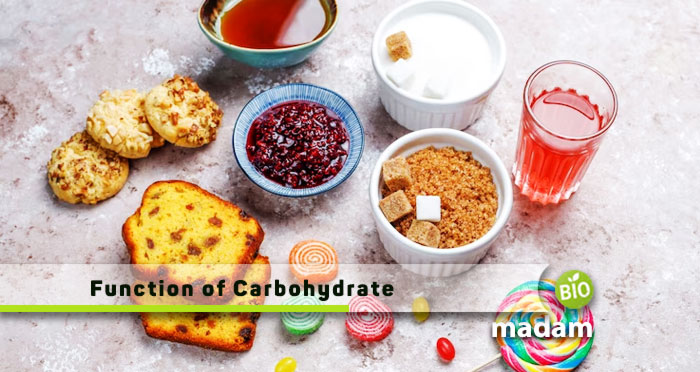Lipids, carbohydrates, and proteins are the three macronutrients in our body, contributing to various cellular and biological functions. They play a specific role in the anatomy and physiology of the human body, ensuring a healthy life. Besides other macronutrients, carbohydrates are essential to bodily processes as they are an energy source for the cells. They produce and store the energy required for carrying out different biological activities. Keep reading to learn the functions of carbohydrates in animals.
What are Carbohydrates?
Carbohydrates are also known as sugars in simple words. They are molecules of carbon, oxygen, and hydrogen with the basic formula Cx(H2O)y. Carbohydrates are of three types, including sugars, starches, and fibers. Starches are also known as complex carbohydrates. At the same time, sugars are simple carbohydrates or natural sugars in fruits, vegetables, honey, and milk.
The recommended dietary allowance for adults is 225 to 325 grams per day for a 2000-calorie diet considering the relationship between carbs and calories. 45 to 65 percent of the total calories should come from carbohydrates; each carbohydrate molecule equals four calories.
Neglecting the recommended daily amount of carbs in your diet may lead to hypoglycemia or hyperglycemia. Both these health conditions can have serious implications if not managed in time.

Functions of Carbohydrates
Now that you know about carbohydrates and their sources, it is time to discuss their role in detail.
Energy Production
Energy production is the main function of carbohydrates in the body. Carbohydrates provide energy to cells which enables biological functions in tissues and organs. Carbohydrates broken down in the small intestine of the digestive system are reabsorbed and distributed back into the body. Cells pick the glucose from the blood using plasma membrane proteins to use that energy. The breakdown of carbon bonds during cellular respiration liberates energy used by cells to perform cellular activities.
Energy Storage
Energy storage is an important function of carbohydrates in animals to provide adequate energy for bodily functions. The body stores excess glucose in muscles and the liver as glycogen, comprising up to fifty thousand single glucose units. The total body glucose reserve is around 4,000 kilocalories with 1,000 kilocalories saved in the liver and 3,000 in the muscles.
Glycogen is highly branched, enabling it to break easily when needed. You may also deplete your glycogen reserves when you exercise for longer periods. At the same time, the liver uses the stored glycogen to facilitate body processes when blood glucose is low. When your body consumes all the glucose, different types of proteins are broken down into amino acids that help produce glucose.
Protein and Lipid Sparing
As mentioned, in case of inadequate glucose, proteins are broken down to produce amino acids that help synthesize glucose. However, when your body has enough glucose, proteins do not have to be metabolized. Thus, glucose in your body spares the breakdown of proteins for synthesizing glucose.
Similarly, the presence of enough glucose in the bloodstream signals the body to not use lipids as a source of energy. So, blood glucose has the same sparing effect on lipids.
Macromolecule Production
Carbohydrates are involved in producing various macromolecules in the body, including DNA and RNA. Some of the absorbed glucose is converted into ribose and deoxyribose to form RNA, DNA, ATP, and NADPH. The presence of carbohydrates is vital to the production of the molecules that contribute to critical developmental and reproductive functions in the body.

Gut Health
Maintaining and promoting gut health is one of the most important functions of carbohydrates in animals. Unlike other sugars, fibers do not break down to form glucose and contribute to digestive functions. The insoluble digestive fiber in bananas is considered good for constipation as this carbohydrate passes through the GIT undigested. It allows stool to pass easily and quickly through the digestive tract. Meanwhile, soluble fiber, another type of carbohydrate, increases the bulk of your stool for easy excretion.
The Bottom Line
Carbohydrates are one of the three macronutrients that contribute to various bodily processes. They are well known for providing energy to body organs for movement and cellular processes. However, the functions of carbohydrates in the body are not restricted to energy production. They also contribute to energy storage and promote gut health. Furthermore, an adequate intake of carbohydrates ensures protein and lipid sparing by acting as a primary energy source.
FAQs
What are the 3 types of carbohydrates?
Carbohydrates are of three types, including sugars, starches, and fibers. Starches are also called complex carbohydrates. Moreover, fiber does not break down into glucose and contributes to GI function.
Which foods are carbohydrates?
Starchy foods like potatoes, rice, cereals, and pasta are significant sources of carbohydrates due to their high carb content. You can also obtain carbohydrates from milk, fruits, vegetables, and whole grains.
What are the effects of too much carbohydrates?
A high intake of carbohydrates can lead to various physiological changes in the body. Their effect on the metabolic system causes an increase in weight and a high risk of heart disease. It may also lead to diabetes – the opposite of hypoglycemia.
What is the deficiency of carbohydrates?
A deficiency of carbs is known as hypoglycemia. It is indicated by 70-99 mg/dL blood sugar levels, exhibiting symptoms like dizziness and hunger.
Which sugar is good for health?
Natural sugars are the best choice compared to artificial options. These sugars are easy to process, and your body absorbs the essential nutrients conveniently compared to highly processed sugars.

Meet me; I am Paulina Zaniewska, who’s more hooked on providing the best health blog. I’ve always been so determined to compete as a nutritionist, and here I am, done with a Master’s in food technology. My brilliant performance throughout encouraged me to help people.

